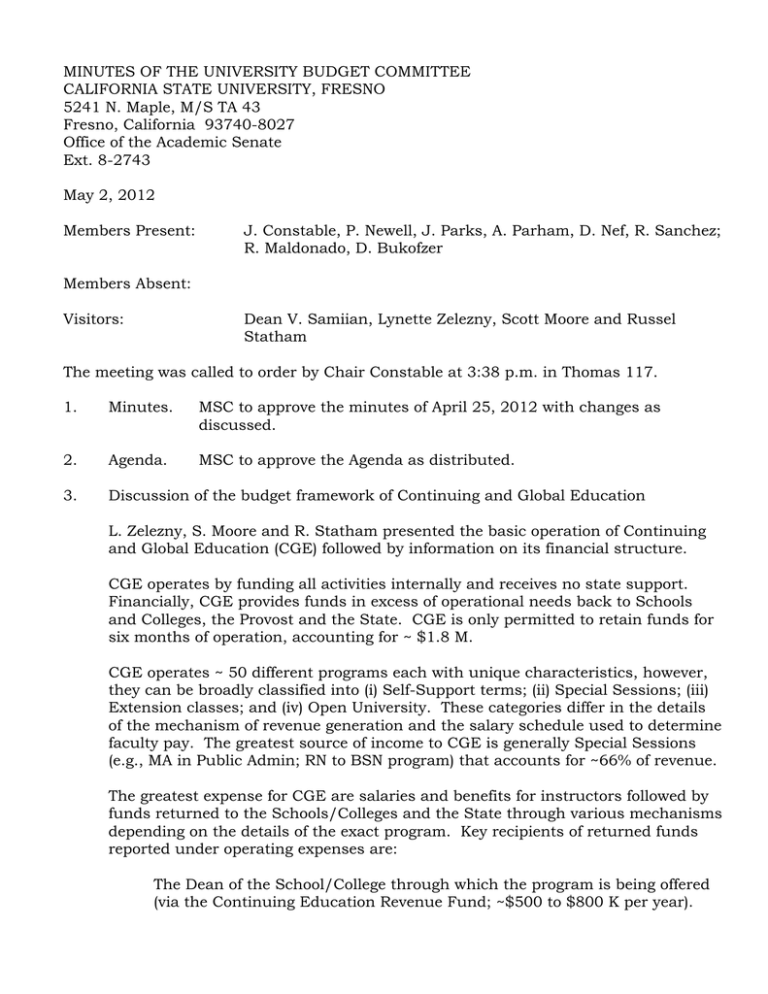MINUTES OF THE UNIVERSITY BUDGET COMMITTEE CALIFORNIA STATE UNIVERSITY, FRESNO
advertisement

MINUTES OF THE UNIVERSITY BUDGET COMMITTEE CALIFORNIA STATE UNIVERSITY, FRESNO 5241 N. Maple, M/S TA 43 Fresno, California 93740-8027 Office of the Academic Senate Ext. 8-2743 May 2, 2012 Members Present: J. Constable, P. Newell, J. Parks, A. Parham, D. Nef, R. Sanchez; R. Maldonado, D. Bukofzer Members Absent: Visitors: Dean V. Samiian, Lynette Zelezny, Scott Moore and Russel Statham The meeting was called to order by Chair Constable at 3:38 p.m. in Thomas 117. 1. Minutes. MSC to approve the minutes of April 25, 2012 with changes as discussed. 2. Agenda. MSC to approve the Agenda as distributed. 3. Discussion of the budget framework of Continuing and Global Education L. Zelezny, S. Moore and R. Statham presented the basic operation of Continuing and Global Education (CGE) followed by information on its financial structure. CGE operates by funding all activities internally and receives no state support. Financially, CGE provides funds in excess of operational needs back to Schools and Colleges, the Provost and the State. CGE is only permitted to retain funds for six months of operation, accounting for ~ $1.8 M. CGE operates ~ 50 different programs each with unique characteristics, however, they can be broadly classified into (i) Self-Support terms; (ii) Special Sessions; (iii) Extension classes; and (iv) Open University. These categories differ in the details of the mechanism of revenue generation and the salary schedule used to determine faculty pay. The greatest source of income to CGE is generally Special Sessions (e.g., MA in Public Admin; RN to BSN program) that accounts for ~66% of revenue. The greatest expense for CGE are salaries and benefits for instructors followed by funds returned to the Schools/Colleges and the State through various mechanisms depending on the details of the exact program. Key recipients of returned funds reported under operating expenses are: The Dean of the School/College through which the program is being offered (via the Continuing Education Revenue Fund; ~$500 to $800 K per year). University Budget Committee May 2, 2012 Page 2 The State General Fund and State Controller's Office (~$200 to $400 K per year). The Chancellor’s Office (~$50-100 K per year). Funds remaining following operating expenses and return of funds to the entities above are deemed surplus and returned to the Office of the Provost through the Academic Development and Planning Fund and totals ~ $1 to $1.5 M per year. 4. Communications and Announcements None received. 5. New Business None received. 6. Discussion of non-reimbursed assigned time Prior to the end of the meeting Chair Constable briefly presented additional information on assigned time provided by Dennis Nef. Assigned time is divided into three categories: Instructional Faculty Fraction (IFF). This portion of assigned time represents non-reimbursed activities as discussed at the UBC meeting of 25 April 2012. Instructional Administrative Fraction (IAF). This portion of assigned time represents non-reimbursed assigned time associated with administrative duties performed by Deans, Associate Deans, and Department chairs. Data related to IAF assigned time were provided by Dennis Nef to the UBC. Other Support Fraction (OSF). This portion of assigned time represents duties that are reimbursed time. Dennis Nef is working on a spreadsheet outlining OSF to provide the UBC with a complete picture of assigned time, both non-reimbursed and reimbursed. The meeting was adjourned at 5:13 p.m. Agenda for Wednesday 9 May 2012. 1. Approval of minutes of 2 May 2012. 2. Approval of agenda for 9 May 2012. 3. Discussion of the structure of Cal State Online with O. Benavides. 4. Communications and Announcements. 5. New Business. 6. Election of UBC Chair for the 2012-2013 Academic year. 2
